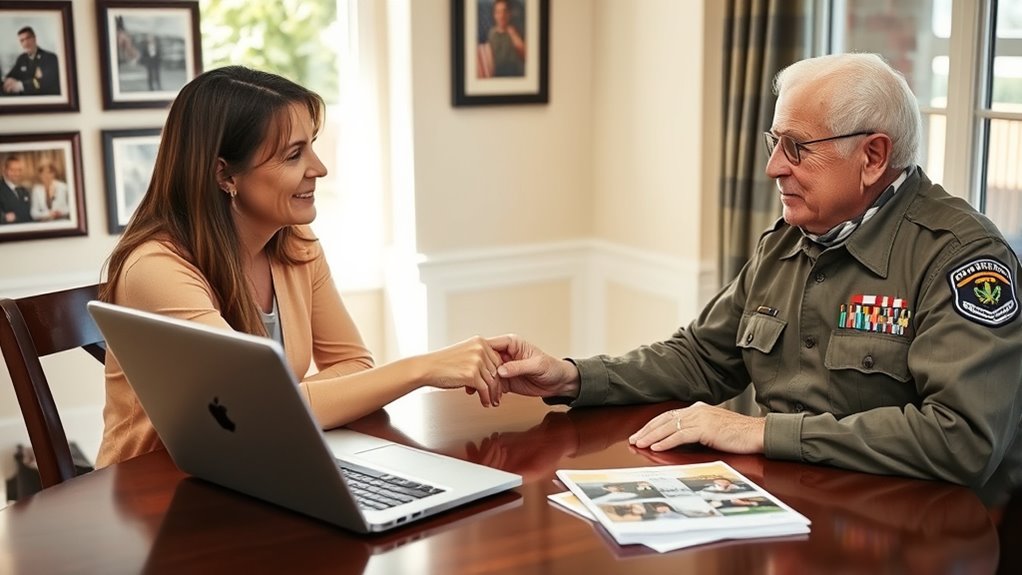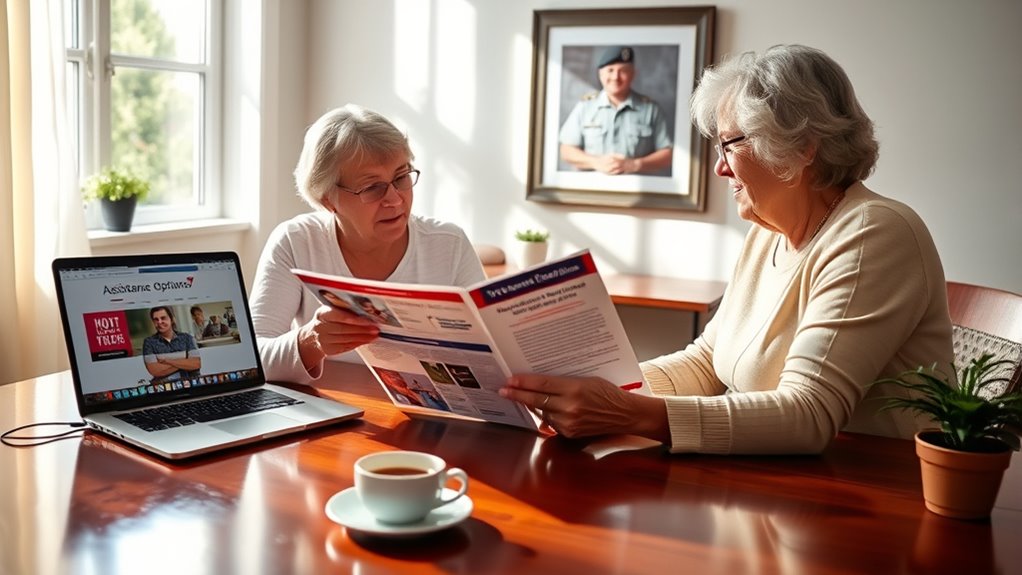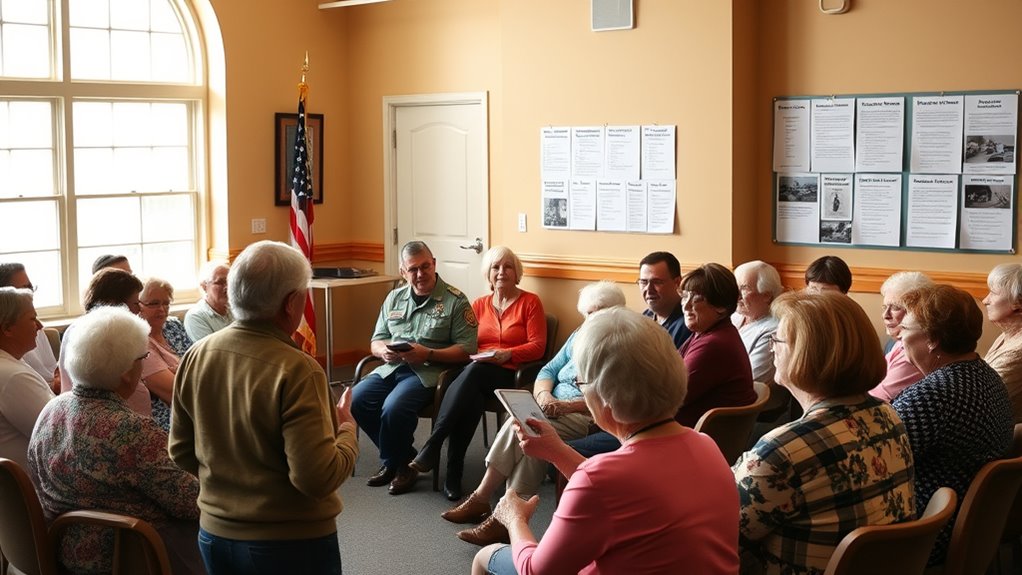Veteran benefits for family caregivers are designed to provide financial support, training, and resources to help you care for a service member or veteran with significant needs. You may be eligible for stipends, counseling, respite services, and educational resources to ease your caregiving journey. Accessing these benefits involves meeting specific criteria and applying through the VA. If you want to learn more about how these programs can support you, keep exploring the available options.
Key Takeaways
- Family caregivers may qualify for stipends, training, counseling, and respite services through VA programs like PCAFC.
- Eligibility typically requires the veteran to have a 70%+ service-connected disability or need daily assistance.
- Caregivers must be the veteran’s primary support and have a documented relationship (spouse, parent, child).
- Benefits include financial support, educational resources, legal aid, and access to specialized care and community services.
- Applications are submitted via VA forms or websites, with verification of veteran’s condition and caregiver relationship.
Overview of Family Caregiver Benefits for Veterans

If you’re caring for a veteran, understanding the benefits available to you is crucial. Family caregiver benefits can provide essential support, including financial assistance, training, and resources to help you manage your loved one’s needs. These benefits recognize the important role you play and aim to ease your caregiving responsibilities. You might qualify for stipends, which can help cover costs related to caregiving tasks. Additionally, there are programs offering health care support, counseling, and education to improve your skills and well-being. Knowing what’s available ensures you can access the right resources at the right time. Supporting informational content can help you better understand how to utilize these benefits effectively. Being aware of the diverse range of benefits available can empower you to make informed decisions about your caregiving journey. Recognizing the benefits process can also help streamline your access to assistance.
The Department of Veterans Affairs Caregiver Support Program

Wondering how the Department of Veterans Affairs (VA) supports family caregivers? The VA Caregiver Support Program offers valuable resources to help you provide better care. It connects you with training, counseling, and peer support to manage your loved one’s needs effectively. The program also offers respite services, so you can take a break when needed, reducing stress and preventing burnout. You’ll gain access to a Caregiver Support Coordinator, who can guide you through available services and benefits tailored to your situation. Additionally, the VA provides educational materials and workshops to strengthen your caregiving skills. Participation in the program aims to improve your well-being while ensuring your veteran receives high-quality care. The VA’s commitment is to support you through this important role, making caregiving more manageable. Supporting caregivers is a key focus of the program, emphasizing the importance of comprehensive assistance for family members. Moreover, the program aligns with divorce guidance principles by helping caregivers navigate complex emotional and financial challenges associated with caring for veterans. Providing training and resources enhances your ability to deliver effective care and manage the unique needs of your loved one. Furthermore, the program incorporates vetted Mother Baby Kids information to ensure caregivers have access to trusted support and safety guidelines for family health. Additionally, the program recognizes the importance of holistic caregiver support, integrating various aspects of well-being to promote a balanced lifestyle.
Eligibility Criteria for Caregiver Benefits

To qualify for caregiver benefits through the VA, you must meet specific eligibility criteria that guarantee the program supports those most in need. First, the veteran you’re caring for must have a service-connected disability rated at 70% or higher, or be determined to need assistance with daily activities due to a service-related condition. You must also be the veteran’s primary caregiver, providing consistent and ongoing support. Additionally, you need to demonstrate that you’re providing care directly related to the veteran’s service-connected condition. Eligibility may also depend on your relationship to the veteran, such as being a spouse, parent, or child. Meeting these criteria ensures that caregiver benefits reach those who genuinely support veterans with significant needs.
Types of Assistance Available to Family Caregivers

As a family caregiver, you have access to various forms of support to help you manage your responsibilities. These include financial assistance, counseling, respite services, and educational resources. Exploring these options can make a significant difference in your caregiving experience. Incorporating supportive environments and resources tailored to your needs can further enhance your caregiving journey. Utilizing professional-grade equipment and training can also improve the quality and efficiency of the care you provide. Additionally, understanding the benefits of eye patch use can be relevant for caregivers managing their own health and wellness routines. Being aware of available legal resources, such as free or low-cost legal aid, can also be beneficial should you encounter legal challenges related to your caregiving duties. For example, many retail hours offer specialized services during peak times that can support your shopping and resource needs efficiently.
Financial Support Options
Are you aware of the various financial support options available to help family caregivers manage the costs of providing care? Veterans Affairs offers several programs to ease your financial burden. The VA Caregiver Support Program provides stipends to eligible caregivers, helping cover expenses related to your loved one’s care. Additionally, the Aid and Attendance pension offers financial assistance to veterans or survivors requiring aid to perform daily activities, which can indirectly support your caregiving role. Some veterans qualify for grants or stipends to purchase adaptive equipment or home modifications. It’s also worth exploring state-specific programs or community resources that provide financial aid or subsidies. By understanding these options, you can better navigate the financial challenges of caregiving and ensure your loved one receives the necessary support.
Counseling and Respite Services
Have you considered how counseling and respite services can support your well-being as a family caregiver? Counseling offers emotional support, helping you manage stress, grief, and burnout. It provides a safe space to discuss challenges and develop coping strategies. Respite services give you temporary relief from caregiving duties, allowing you to rest, run errands, or spend time on yourself. These services can be scheduled regularly or as needed, ensuring you don’t become overwhelmed. Access to counseling and respite care helps maintain your mental health, prevents burnout, and improves your overall quality of life. Taking advantage of these benefits shows you’re prioritizing your well-being while providing essential care for your loved one. Don’t hesitate to explore these support options available to you.
Educational and Training Resources
Wondering how you can become more confident and effective in your caregiving role? Luckily, there are educational and training resources available to help you gain essential skills. These programs provide valuable knowledge on caregiving techniques, managing health conditions, and navigating VA benefits. To get started, consider these options:
- Attend VA-sponsored workshops and seminars to learn best practices.
- Access online courses and webinars tailored for family caregivers.
- Utilize printed guides and resources from veteran organizations for ongoing support.
These resources empower you to provide better care, reduce stress, and feel more prepared. By taking advantage of these training opportunities, you’ll develop the skills needed to support your loved one confidently and effectively.
How to Apply for Veteran Caregiver Benefits

To start your application for veteran caregiver benefits, you’ll need to understand the eligibility requirements and gather the necessary documents. Next, you’ll submit your application through the appropriate channels, whether online or in person. Once you complete these steps, you’ll be on your way to accessing the support you deserve. Familiarizing yourself with essential oils for health support can also be beneficial in managing your well-being during this process.
Eligibility Requirements Overview
Applying for veteran caregiver benefits involves meeting specific eligibility criteria and completing the necessary steps to submit your application. To qualify, you generally must be the primary family caregiver of a veteran who meets certain service or disability requirements. You also need to provide documentation proving your relationship and the veteran’s condition. Here are key points to determine your eligibility:
- You’re caring for a veteran with a service-connected disability rated at 70% or higher.
- The veteran receives or is eligible for VA benefits.
- You’re identified as the primary caregiver by the veteran or VA healthcare provider.
Ensuring you meet these requirements helps streamline your application process and increases your chances of approval.
Application Submission Process
Once you’ve confirmed your eligibility, the next step is to complete and submit your application for veteran caregiver benefits. You can apply online through the VA’s website, which offers a straightforward process. Create an account or log in if you already have one, then fill out the Caregiver Application (VA Form 10-10CG). Be prepared to provide details about the veteran’s service, your relationship, and your caregiving role. You can also apply by mail by downloading the form from the VA website, filling it out, and mailing it to the appropriate VA regional office. Additionally, some veterans or caregivers may prefer in-person assistance at a VA facility. Make sure to double-check all information for accuracy before submitting your application.
Support Services and Resources for Caregivers

Supporting family caregivers is essential, and there are numerous services and resources designed to help you manage your responsibilities more effectively. These resources can provide practical support, education, and emotional relief. First, you can access local and national caregiver support programs that offer training and counseling. Second, veteran-specific organizations often provide resources tailored to your loved one’s needs, including peer support groups. Third, many VA facilities have caregiver coordinators who can connect you with services, respite care, and community resources. Utilizing these options helps reduce stress and improves the quality of care you provide. Additionally, understanding the specific needs related to your loved one’s condition, such as specialized care requirements, can enhance your ability to support them effectively. Recognizing caregiver support services can further connect you with helpful tools and networks. Being aware of the comprehensive support options available can also help you find the assistance best suited to your situation. Staying informed about Etsy Shop SEO strategies can provide additional avenues for generating income or support. Moreover, exploring training programs specifically designed for family caregivers can equip you with essential skills for effective caregiving. Remember, you’re not alone—these services are here to support you every step of the way.
Financial Benefits and Compensation Options

Guiding the financial benefits and compensation options available to family caregivers can greatly alleviate your burden and make certain you receive the support you deserve. The VA offers programs like the Program of All-Inclusive Assistance for Family Caregivers (PCAFC), which provides monthly stipends to eligible caregivers of severely injured veterans. You may also qualify for stipends through the Aid and Attendance pension, helping cover personal care costs. Additionally, there are employment protections, such as the Family Medical Leave Act (FMLA), allowing you to take time off without losing your job. Some veterans and caregivers might also access grants or reimbursements for respite care or specific medical expenses. Exploring these options ensures you receive the financial support needed to provide effective, sustained care. Understanding air purifier maintenance techniques can help tailor caregiving strategies to your loved one’s unique needs. Incorporating efficient general ledger coding practices can also assist organizations in managing these benefits more effectively and ensuring timely disbursements. Recognizing the importance of spiritual energy can offer emotional resilience and inner strength during caregiving challenges. Additionally, implementing targeted outreach strategies can help ensure caregivers are aware of and can access these valuable benefits.
Additional Resources and How to Stay Informed

Staying informed about available resources is essential for family caregivers to maximize the support they receive. To do this effectively, you should:
- Regularly visit official VA websites and caregiver portals for updates.
- Subscribe to newsletters and alerts from veteran and caregiver organizations.
- Attend webinars, workshops, and local support groups to connect with experts and peers.
Frequently Asked Questions
Can Caregivers Receive Benefits for Veterans Outside the U.S.?
You might wonder if caregivers can access benefits for veterans outside the U.S. You should know that generally, veteran benefits are limited to those within the United States or its territories. Some exceptions apply, especially if the veteran is receiving care through specific programs or arrangements. It’s best to consult the VA or a legal expert to get precise information tailored to your situation, as rules can vary.
Are There Specific Training Programs for New Caregivers?
Yes, there are specific training programs for new caregivers. You can access these through VA resources, local agencies, or nonprofit organizations. These programs often cover essential skills like medication management, mobility assistance, and emergency response. Participating in such training helps you feel more confident and competent in your caregiving role. Check with your local VA office or caregiver support centers to find programs tailored to your needs.
How Long Does the Application Process Typically Take?
Did you know that the application process for veteran caregiver benefits typically takes around 30 days? You might find it varies depending on your specific situation and how quickly you submit all required documents. To speed things up, guarantee your paperwork is complete and accurate. Once you apply, stay proactive and follow up if you haven’t received updates within a few weeks. Patience and thoroughness can help you receive benefits faster.
Can Caregivers Access Mental Health Support Services?
You can access mental health support services through various programs available to family caregivers. Many VA facilities offer counseling, support groups, and mental health resources tailored for caregivers. You just need to inquire at your local VA or through your caregiver support coordinator. These services aim to help you stay mentally healthy while providing care. It’s important to reach out and take advantage of the support systems designed for your well-being.
Are Benefits Available for Caregivers of Deceased Veterans?
Did you know that about 85% of caregivers find benefits helpful? If you’re caring for a deceased veteran’s family, some benefits might still be available to you. These include survivor compensation, educational benefits, and access to certain healthcare services. You should explore options through the VA or local support programs. Your dedication matters, and there are resources to support you even after your loved one has passed.
Conclusion
Now that you know the ins and outs of veteran caregiver benefits, you’re equipped to access life-changing support for your loved one. Don’t miss out—these benefits can transform your caregiving journey from overwhelming to manageable. With the right resources and eligibility info, you’ll be unstoppable in providing the best care possible. Remember, this support is a game-changer, turning everyday challenges into opportunities to make a real difference in your veteran’s life.








